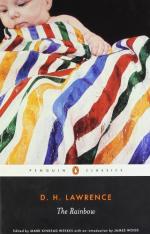|
This section contains 1,516 words (approx. 4 pages at 400 words per page) |

|
While Lawrence owes an undeniable debt to the great English novelists of the nineteenth century, his best work, this novel especially, stands out for his refinements upon, and notable departures from their work. His immediate predecessor, Thomas Hardy, is often cited by critics as a dominant influence; he is the one English writer on whom Lawrence wrote a full-length study. Hardy shared with Lawrence an intense interest in malefemale relationships, and it is easy to see some similarity between Ursula's struggles with the inadequate Skrebensky and Tess's with the sanctimonious Clare and the cynical, worldly D'Urberville (Tess of the D'Urbervilles, 1891; see separate entry).
But Lawrence's sensibility is different and his exploration of the human character more profound. For one thing, at least in the earlier novels, he lacks the pessimism and fatalism found in Hardy's famous, later novels, like Tess and Jude the Obscure (1895; see separate...
|
This section contains 1,516 words (approx. 4 pages at 400 words per page) |

|




